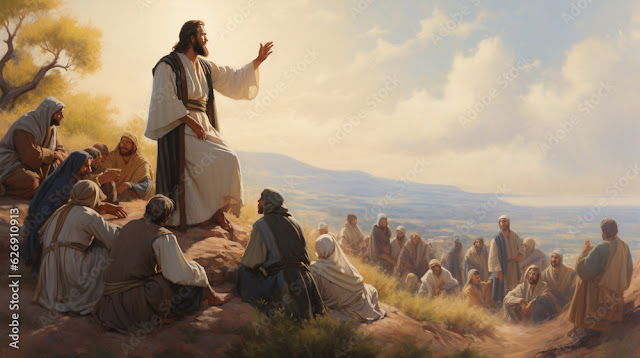Why Am I Walking?
Have you
ever done a pilgrimage – like the Pilgrims’ Way in the UK? I heard there is one
from the Isle of Skye to Lindisfarne, too. Or, famously among the Christian
community, El Camino de Santiago in Spain with starting points in France
or Portugal, as well as other pilgrimages in Israel, naturally. There is
a pilgrimage terminus not far from me, at Walsingham, which I drive to (sic!)
from time to time. But: “Life’s a journey” has become such a trite cliché, hasn’t
it, and, apparently, everyone is on “their journey" – whether spiritual, experiential,
emotional, psychological – even professional. So, is this some New Age reappropriation
of ancient religious practices, notably Christian and Muslim?
Maybe.
Whatever it is, it is certainly a helpful metaphor to think of our life as some
kind of pilgrimage if we want to reassure ourselves that there is some point in
our being, and that there is some purpose in our experience from birth to death
and, we hope, beyond.
There are
days when I feel alone, empty, and pointless, frankly. I wake up wondering if
today will be - in any small way - different from yesterday. At 66,
where am I today that I wasn’t at 56; other than slower, more arthritic or, if
only a little bit, more forbearing; wise even? I don’t even have a legacy that “the
world” would recognise, or my fellow-wayfarers acknowledge as Spirit-inspired.
I own nothing of consequence, have founded nothing: either as a business
enterprise, a charity or even a ‘church’ of some kind. Ironically, I pray some
Psalms every morning, including Psalm 103, which includes the context-situating
lines: As for man, his days are like grass; like a flower of the field, he
flourishes. A wind passes over it, and it is gone, and its place acknowledges
it no longer.” How’s that for legacy!
Confucius famously
insisted that “a journey of 1,000 miles, begins with the first step.” That kind
of fortune-cookie, head-in-the-clouds philosophy may not go down too well with
the children of the Enlightenment, or the offspring of the Age of Reason, but
it seems to inspire a certain “spiritual-not-religious” mentality that is in
vogue, now, and, like spirituality, resonates with the post-modern paradigm. This
is not altogether a bad thing, I think. And, if nothing else, a pilgrimage - of
any kind - certainly gives purpose and can be transformative just in, and of,
itself (even without a conscious “religious or spiritual” angle), allowing time
to meditate and discover something of our interior hinterland. And keep fit!
Why am I
walking? Why are you walking? If you are a believer in Christ, then you,
like me, will focus on the fact that Jesus said he was “The Way, the Truth and
the Life…” so, in Him are our purpose, our direction and how we achieve them.
If this is so, and if we accept the truth that we are in Christ and that
God (Father, Son and Mother Spirit) is in us – our very being itself –
then any “journey” we are on is from the False Self we have lived in while
ignorant of our ‘salvation’ (rescue; healing; wholeness) through Jesus, to our
True Self (to use Jungian phraseology) who is in the very image of God. Henri
Nouwen writes that it is better for us to be “reaching in” rather than “reaching
out,” for: When you befriend your true self and discover that it is good and
beautiful, you will see Jesus there. Where you are most human, most yourself,
weakest, there Jesus lives. Bringing your fearful self home is bringing Jesus
home.” (From Live Patiently With “Not Yet” in The Inner Voice of
Love Doubleday, 1966). I think I have quoted some of this before, but when
I, somewhat anxiously, cry “Why am I walking?” this reassures me by way of an
answer.
One who is
most definitely walking the talk is Brian McLaren. A while back I
read through a sort of workbook he wrote for Wayfarers, entitled We Make The
Road by Walking. The title comes from one of Brian’s heroes, Brazilian
educator/activist Paolo Freire. He used this title for a published dialogue
between Freire and another seminal educator/activist, Myles Horton, who was an
important figure in the Civil Rights Movement in the US. Freire may have
derived the quote from the great Spanish poet Antonio Machado: “Caminante, son
tus huellas el camino, y nada más; caminante, no hay camino, se hace camino al
andar. Al andar se hace camino, y al volver la vista atrás se ve la senda que
nunca se ha de volver a pisar. Caminante, no hay camino, sino estelas en la
mar.”
Wanderer, your footsteps are the road, and nothing more; wanderer, there is
no road, the road is made by walking. By walking one makes the road, and upon
glancing behind one sees the path that never will be trod again. Wanderer,
there is no road– Only tracks upon the sea.
Either way, McLaren’s book is certainly helpful to reset our mind on the fact that the
way is in us; the way is Christ in us; the way is us! So,
like all weary pilgrims, it’s why I get up in the morning, lace up my “Gospel-of-peace”
boots (as in Paul’s: “For shoes, put on the peace that comes from the Good News
so that you will be fully prepared…” Ephesians 6:15 NLT) and step out on that “narrow
way” that leads to life. My life.
*So,
if you would like something to listen to and inspire you as you “walk” your
day, I heartily recommend the Nomad podcast for
every wayfarer, whether they walk alone or in company. The link is to an
interview with Brian McLaren – but, definitely: scroll through the archives and
sign up for ongoing podcasts.*




Comments
Post a Comment